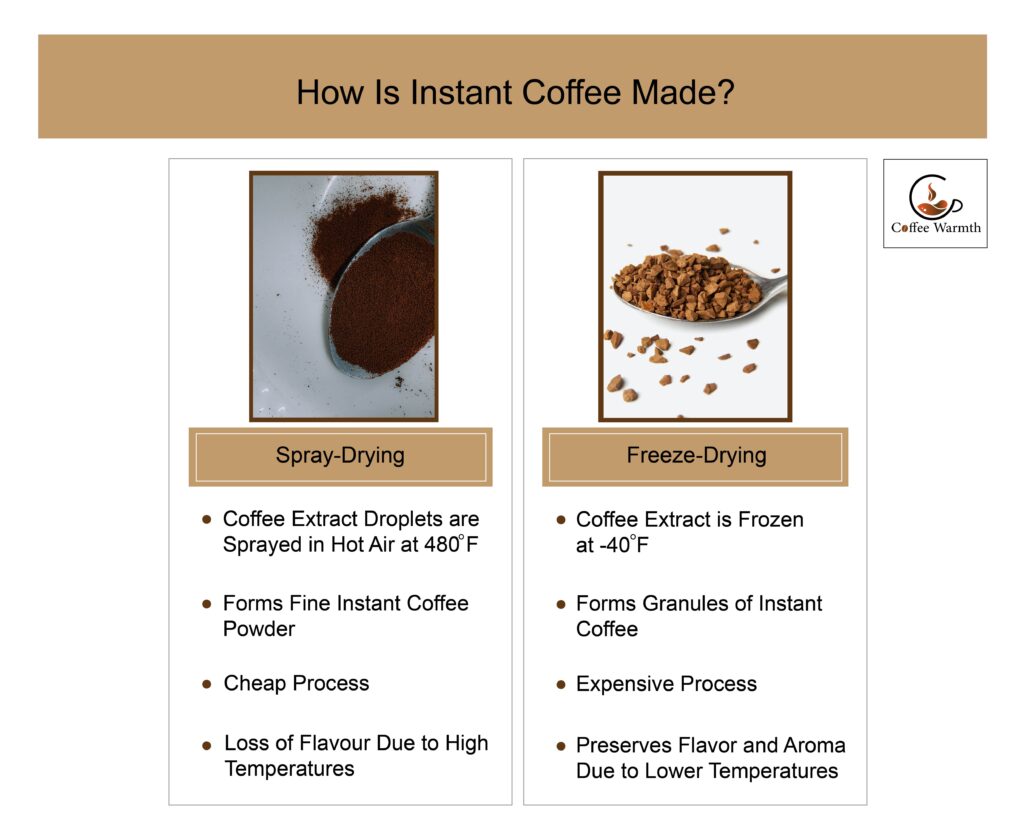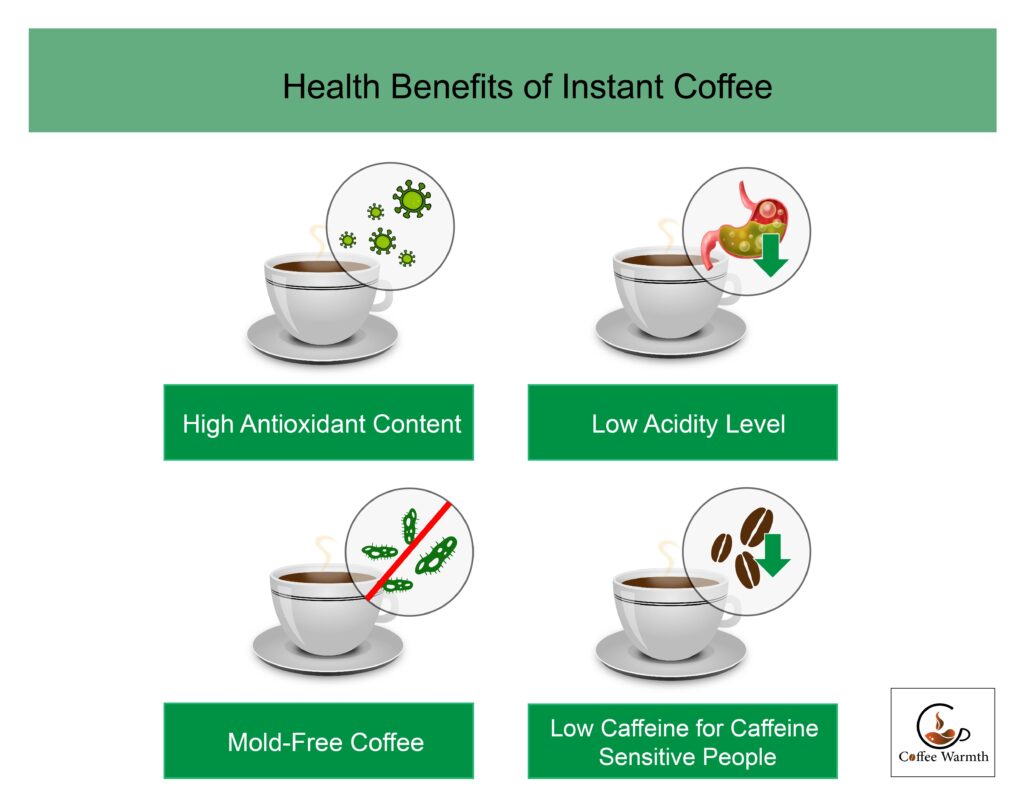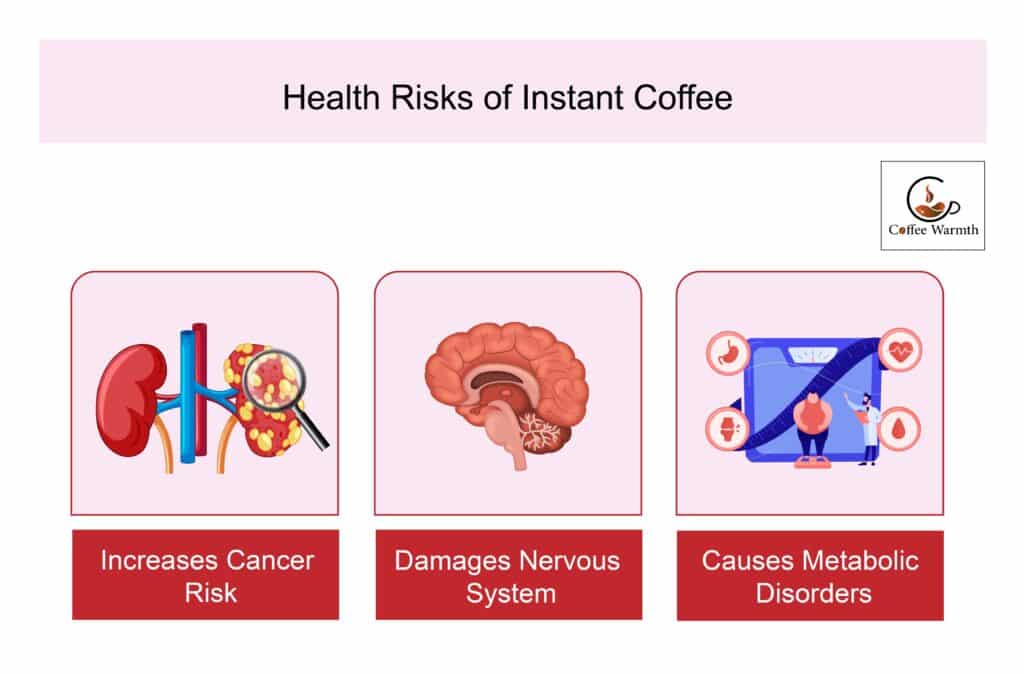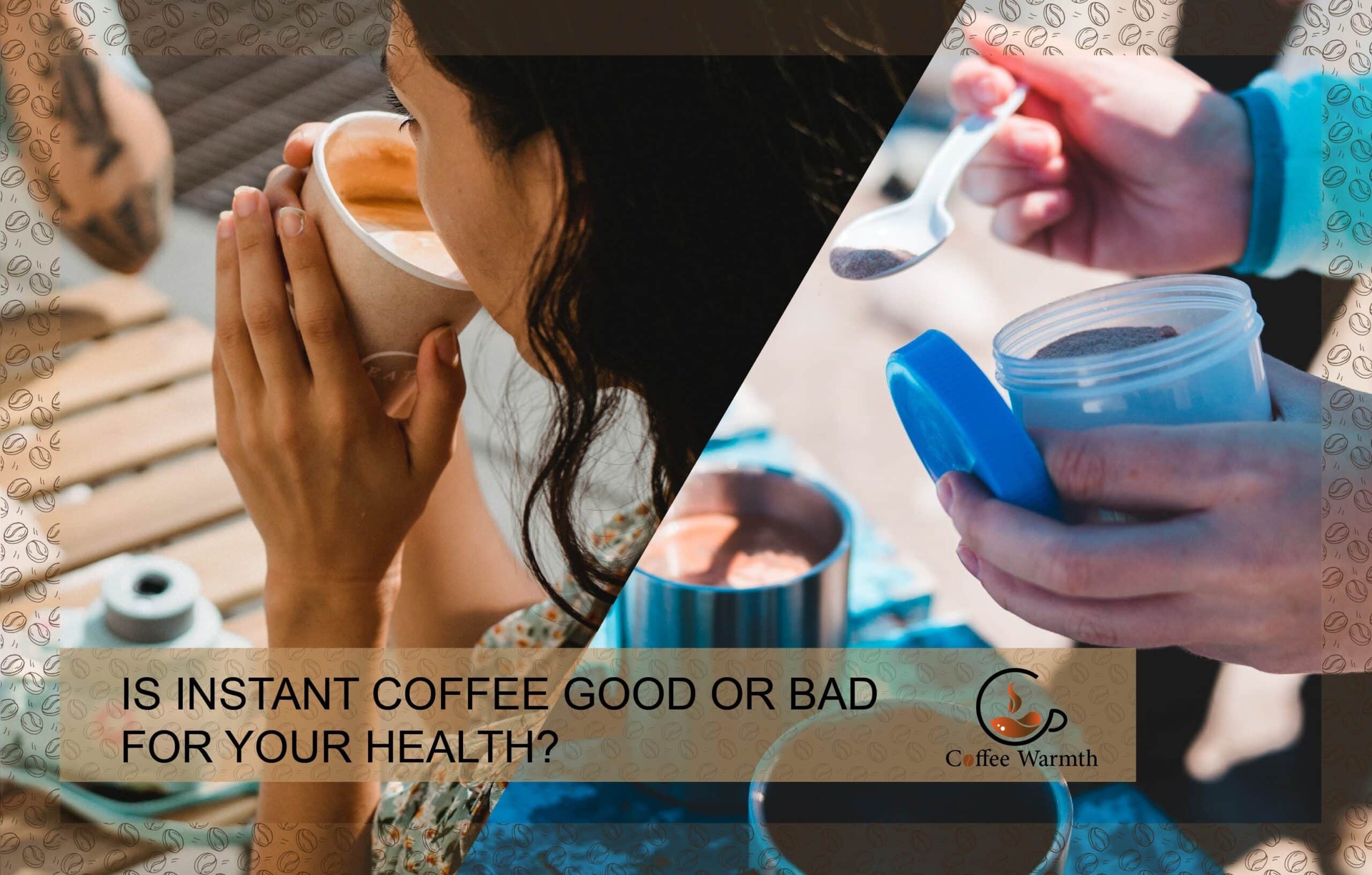Instant coffee is both good and bad for your health depending on your intake and general health condition. Instant coffee in 8 fl.oz. cup contains 62 mg caffeine, 2.4 calories, and little to no nutrients. It contains lower caffeine content than regular coffee so its health benefits are also limited. However, it still provides a high boost of antioxidants, a less acidic cup of coffee, and low caffeine content for caffeine sensitive people.
Instant coffee is linked with some serious long-term health risks due to the presence of acrylamide. Drinking too much instant coffee increases acrylamide content in the body which can cause cancer and damage to the nervous system.
Instant coffee is different from ground coffee in a way that it is a dried brewed coffee whereas ground coffee has to be brewed using different brewing methods. You can make instant coffee simply by adding 1-2 teaspoons of instant powder or granules in an 8 fl.oz. cup of water.
What is instant coffee?
Instant coffee is a beverage made by adding milk or water in the dried powdered or granular coffee concentrate. It has the same aroma, taste, and flavor profile as that of regular coffee. Instant coffee, as the name represents, is made quickly.
What is the nutritional value of instant coffee?
The nutritional value of a 8 fl.oz. or 240 grams cup of instant coffee is described in the following table.
| Quantity | Daily Value | |
| Calories | 2.4 | 0% |
| Total Fat Saturated Fat Trans Fat Polyunsaturated Fat Monounsaturated Fat Cholesterol | 0g 0g 0g 0g 0g 0mg | 0% |
| Sodium | 9.6mg | 0% |
| Total Carbohydrates Dietary Fiber Sugars | 0g 0g 0g | 0% |
| Protein | 0.2g | 0% |
| Vitamin D | 0mcg | 0% |
| Calcium | 9.6mg | 1% |
| Iron | 0.1mg | 0% |
| Potassium | 71.5mg | 2% |
| Phosphorus | 5.4mg | 0% |
| Caffeine | 62mg | 0% |
How much caffeine is in instant coffee?
The amount of caffeine in an 8 fl.oz. cup of instant coffee is 62 mg. Instant coffee has less caffeine compared to a regular cup of coffee i.e., 95 mg caffeine per 8 fl oz cup and more caffeine than decaf coffee i.e., 1.8 mg caffeine per 8 fl oz cup.
How is instant coffee made?
The process of making instant coffee is similar to regular coffee. Instant coffee is made by extracting the roasted ground coffee. The soluble and volatile compounds of ground coffee are extracted with hot water which helps extract rich flavor and aroma. This extraction is carried out under high temperatures and pressures to fully draw out the chemical compounds from the ground coffee. After extraction, coffee extract forms which is then dried to make instant coffee. The coffee extract can be dried in two ways i.e., spray-drying and freeze-drying.
Spray-drying. The droplets of coffee extract are sprayed into hot air at 480°F. The droplets quickly dry into fine instant coffee powder. It is a cheap process but it can lead to loss of flavor due to high temperatures.
Freeze-drying. The coffee extract is frozen at -40°F and cut into granules. It is then heated and dried inside a vacuum chamber. Freeze-drying is expensive but it preserves aroma and flavor better than spray-drying due to lower temperatures.
The table shown in the diagram lists the comparison between spray-drying and freeze-drying.

What are the health benefits of instant coffee?
The health benefits of instant coffee are high antioxidant content, low acidity level, mold-free coffee, and low caffeine for caffeine sensitive people as listed in the diagram below.

Although low caffeine content is good for caffeine sensitive people, the general coffee health benefits become less pronounced.
- High antioxidant content
Instant coffee provides more powerful antioxidants compared to other brewed coffees. A higher antioxidant content is attributed to the use of robusta coffee beans and an extraction process that enriches instant coffee with chlorogenic acids and caffeine.
Instant coffee has a high total antioxidant capacity and a greater protection against oxidative stress, as supported by a study published in American Chemical Society Publications.
Coffee consumers have an increased drive to buy instant coffee because of its antioxidants capacity, as stated in the Journal ‘Beverages’.
- Low acidity level
Instant coffee has a lower acidity and a higher pH compared to other coffee drinks. Instant coffee with milk has a pH of 6.2 as found by researchers from Riyadh.
Low acidity level prevents potential risk of heartburn, gastroesophageal reflux disease (GERD), gastric ulcers, and irritable bowel syndrome (IBS). Thus, drinking instant coffee is a good option for patients with sensitive digestive systems.
- Mold-free coffee
Good quality instant coffee has less molds compared to other brews. The reason for less molds is that instant coffee is freeze-dried and then packaged. However, some instant coffees may have mold due to use of poor quality coffee beans.
- Low caffeine for caffeine sensitive people
Instant coffee contains 62 mg caffeine in a 8 fl oz cup compared to 95 mg in a similar size cup of regular coffee. This low caffeine content is highly beneficial for caffeine sensitive people who can enjoy a cup of joe without having to worry about the side effects of caffeine.
What are the health risks of instant coffee?
The health risks of instant coffee are the following.

- Instant coffee can increase cancer risk
Instant coffee has a high level of acrylamide, a chemical, which forms when coffee beans are roasted at high temperatures. High acrylamide intake has been found to be significantly linked with the increased risk of different cancers.
Women who drink instant coffee are at a greater risk of breast cancer as compared to non-consumers, according to a study published in the ‘Scientific Reports’. Another study in Cancer Epidemiology, Biomarkers & Prevention found that instant coffee does not provide a protective effect on colorectal cancer as opposed to other types of coffees.
- Instant coffee can damage the nervous system
Acrylamide found in instant coffee is a neurotoxin which can damage the nervous system and cause behavioral and reproductive changes. Acrylamide inhibits axonal transport and neurotransmitter release which affects the nervous system. Although the acrylamide content in instant coffee is not significant, drinking too much coffee causes accumulation of this neurotoxin over time which can lead to negative effects.
- Instant coffee can cause metabolic disorders
Instant coffee can cause metabolic disorders by decreasing good cholesterol and increasing weight in habitual consumers. A study in the ‘Diabetes Research and Clinical Practice’ examined the effect of instant coffee consumption on metabolic disorders in 17,953 Korean adults. 76% of individuals used sugar and creamer in instant coffee. The results showed 1.5 times greater risk of metabolic disorders, decreased levels of good cholesterol, and obesity.
How is instant and ground coffee different?
Instant coffee is a dried, brewed coffee concentrate which is available in powder and granule form. On the other hand, ground coffee is the end product after grinding roasted coffee beans. It is then brewed using different brewing methods.
Making instant coffee is highly convenient but it has less developed flavors as compared to ground coffee. That’s because ground coffee can impart a wider range of flavors using different brewing methods. So, meanwhile instant coffee is a quick hack for coffee lovers, they will have to compromise on the unique flavor profile of freshly brewed coffee.
Instant coffee has less caffeine than ground coffee. Although this is an advantage for caffeine sensitive people, low caffeine content in instant coffee imparts less health benefits than ground coffee.
How much instant coffee is used for one cup?
1-2 teaspoons or 2-4 grams of instant coffee is used for one cup of 8 fl oz or 236 ml water. The amount of instant coffee per cup varies according to the individual preference. So, you can increase or decrease the quantity of instant coffee depending on your taste.
Does instant coffee need hot or cold water?
Instant coffee needs hot water commonly but can use cold water too. Both hot and cold water dissolve the instant coffee powder perfectly.
If you’re not looking to drink a hot beverage, use cold water. Cold water instant coffee is fresher compared to hot water as hot water tames and evaporates some of the flavor whereas cold water retains most of it.
How long does instant coffee last?
Instant coffee can last from 1-20 years if stored in an air-tight container at a cool and dry place. Most instant coffee brands have an expiry date of 2 years after opening the package if they’re stored properly at a cool place. Instant coffee has a longer shelf life than regular coffee because of its low moisture content.
Is decaf instant coffee good for you?
Yes, decaf instant coffee is good for you as it has nearly the same health benefits as that of a caffeinated instant coffee. Decaf instant coffee contains all coffee nutrients like antioxidants and polyphenols except caffeine. A 8 fl.oz. cup of decaf instant coffee has only 1.8 mg caffeine which makes it a good alternative for caffeine sensitive people.
